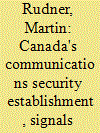| Srl | Item |
| 1 |
ID:
080331


|
|
|
|
|
| Publication |
2007.
|
| Summary/Abstract |
Canada's Communications Security Establishment has undergone a far-reaching transformation in conjunction with the expanded role of Signals Intelligence in the global 'war on terror'. For the first time, Canada adopted a formal statute for CSE, including an expanded remit for countering terrorism. With a shift in targeting priorities towards terrorism and threats to Canadian interests abroad, Canada's participation in SIGINT-related international partnerships takes on new significance. The collection of communication intelligence touches upon public sensibilities regarding privacy rights of Canadians. The evolution of Canadian SIGINT capabilities was therefore accompanied by the establishment, as early as 1996, of a system for intelligence accountability and review, the Office of the CSE Commissioner. Recent advances in communications technology and pressing requirements for Signals Intelligence have impelled changes in the law, while also accentuating the role played by the CSE Commissioner in scrutinizing CSE activities to ensure compliance with ministerial authorizations and the laws of Canada
|
|
|
|
|
|
|
|
|
|
|
|
|
|
|
|
| 2 |
ID:
080330


|
|
|
| 3 |
ID:
080332


|
|
|
|
|
| Publication |
2007.
|
| Summary/Abstract |
When a leader suffers from a diminished ability to formulate high quality judgments and decisions, international peace and security may be compromised. Systematic use of medical intelligence on foreign leaders can provide early warning to American leaders about the potential for destabilization in particular regimes where leaders are gravely ill. This information remains particularly important in less democratic governments, where power and decision making remain concentrated in the hands of very few, or even one man, or where an entire governmental structure appears unstable. This paper examines the impact of medical illness in foreign leaders in four cases in American foreign policy: the Shah of Iran; Ferdinand Marcos; Tancredo Neves; and Boris Yeltsin
|
|
|
|
|
|
|
|
|
|
|
|
|
|
|
|